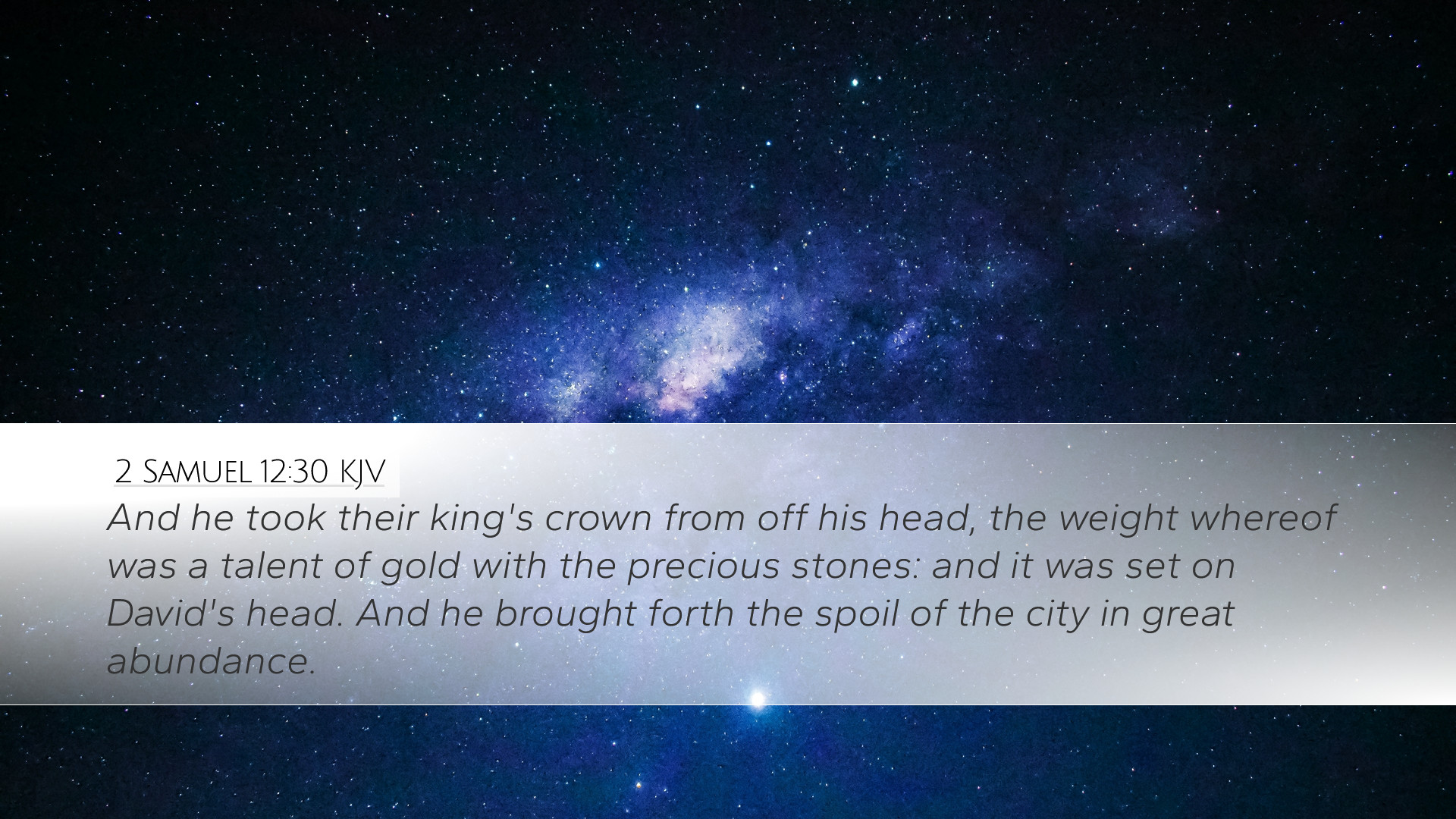Commentary on 2 Samuel 12:30
2 Samuel 12:30 reads: "And he took their king's crown from off his head, the weight whereof was a talent of gold with the precious stones: and it was set on David's head. And he brought also exceeding much spoil out of the city."
Contextual Understanding
This verse occurs following the defeat of the Ammonites, a significant event in David's military campaigns. The preceding chapters reveal David's moral failures and his subsequent repentance, particularly his sin with Bathsheba and the arranged murder of Uriah. Despite these failures, God continues to fulfill His covenant promises to Israel through David.
- Historical Background: The Ammonites were a long-time adversary of Israel. Their defeat, resulting from David's strategic military actions, signifies not just a victory but also the restoration of David's kingship and the favor of God.
- The Symbolism of the Crown: The crowning of David with the Ammonite king's crown symbolizes God's authority over all nations and His chosen leader's supremacy.
Insights from Commentators
Matthew Henry's Commentary
Henry notes that the fact that the crown is taken and placed upon David signifies the transfer of authority and the vanquishing of the enemies of Israel. He emphasizes that the glory of victory belongs to God, framing David’s achievements as a direct extension of divine favor.
Albert Barnes' Notes
Barnes elaborates on the magnitude of the crown, weighing a talent of gold, which underscores the wealth and power represented by the Ammonite king. He points out that this extravagant display of riches was meant to highlight the folly of opposing the people of God. In taking the crown, David not only gains a physical symbol of victory but also reinforces his role as the established king of Israel and a leader divinely appointed.
Adam Clarke's Commentary
Clarke provides a detailed portrayal of the significance of the "precious stones" in the crown, noting that these jewels reflect the glory of God's creation and His providence in granting victory. He asserts that the crown's placement on David’s head serves a dual purpose: it is a reminder to Israel of God's faithful leadership through David while also reaffirming David's rightful place as king, despite his previous sins. Clarke argues that such redemptive acts are critical to understanding God's grace in the narrative of David's life.
Theological Implications
This verse presents rich theological themes relevant to pastors and theologians, particularly regarding grace, repentance, and divine sovereignty. David’s rise, despite his significant moral failures, illustrates God's unwavering mercy and His ability to restore the fallen.
- Grace and Restoration: David’s acceptance of the crown represents God's willingness to restore a broken individual and use him for divine purposes.
- Divine Sovereignty: The passage serves as a reminder that God retains ultimate control over nations and kings, executing His will through human leaders, irrespective of their personal shortcomings.
- Symbolism of Power: The transaction of the crown indicates the established order of authority by God’s design, wherein earthly crowns and victories ultimately belong to Him.
Practical Applications for Today
For modern leaders and believers, this passage offers profound insights into the nature of leadership and the importance of humility and acknowledgment of God's role in our successes. It encourages:
- Accountability: Understanding that success is not merely a product of personal effort but rather a consequence of divine grace.
- Courage in Repentance: Acknowledging our failures and seeking restoration, reaffirming that God's plan for our lives remains intact despite our shortcomings.
- Embracing Sovereignty: Recognizing that all authority ultimately derives from God, urging leaders to operate under His guidance and wisdom.
Conclusion
In conclusion, 2 Samuel 12:30 serves as a potent reminder of God’s capacity to redeem and restore. The significance of the crown, both materially and spiritually, reaffirms the theme of God's providence in human affairs. This commentary draws from the insights of notable theologians like Matthew Henry, Albert Barnes, and Adam Clarke, providing a holistic reflection on the verse that can enlighten pastors, scholars, and students in their study of Scripture and its implications for leadership and faith.


